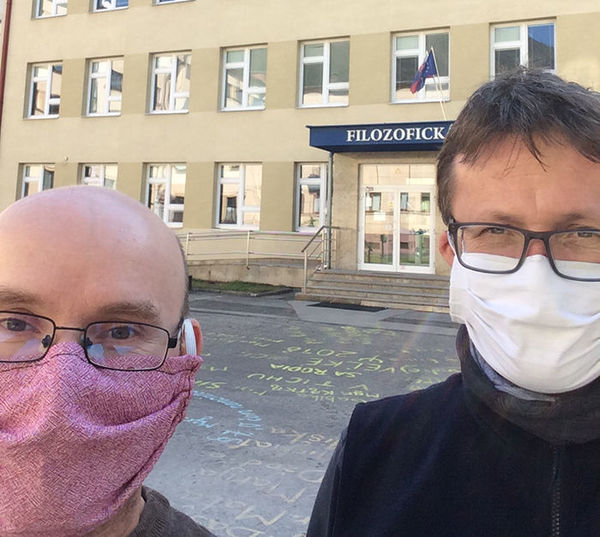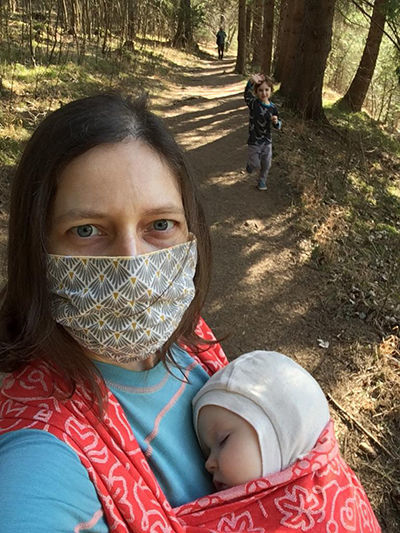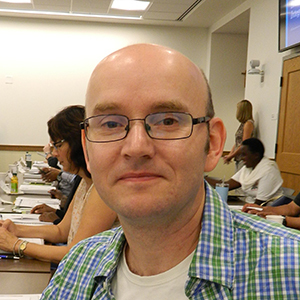
The following reflection was drafted in April 2020 by Eugen Zeleňák, associate professor at the Catholic University in Ružomberok, Slovakia. The Catholic University in Ružomberok is a member of the Nanovic Institute's Catholic Universities Partnership.
I remember discussing with a friend and colleague her upcoming visit to France for an Erasmus scholarship. She was expected to travel with her family the next day, and they were considering what to do. Both of us contemplated what might happen but concluded that if her destined region of France was quite safe it was probably fine to travel. It was March 6. Later that day I learned the Slovak government confirmed the first case of COVID-19 in our country. Well, I expected it to happen eventually...
What I did not expect was how quickly our lives would change. Within a week, Slovakia was a different country with almost everything shut down—my friend and her family found it almost impossible to return from abroad. Their flight was canceled, and they were forced to plot an adventurous course: in the end, they had to cross the Slovak border on foot and spend the next two weeks in quarantine.
I write this six weeks since Slovakia announced its first confirmed case of COVID-19, yet it took only about a week to implement strict measures and dramatically change the pace of life.
After the first case, life changed very quickly. Within two days some of the universities suspended in-person instruction. It took just a few more days for all universities to shut down. Then some more days and all schools and kindergartens in Slovakia were closed. The Catholic University in Ružomberok transitioned to remote teaching and learning systems. Our library and faculty buildings are essentially closed. Only the rector, vice-rectors, deans, vice-deans, and select administrative staff go to work. Most of the employees work from home. Faculty have had to deal, unexpectedly, with many new challenges: to instruct teachers and students to make use of remote teaching and learning; to change various deadlines; to think about how this and that could be done online. All of these responses to the developing pandemic, respecting the laws and regulations of the day, were implemented so that we may continue to serve as educators, even though we could not possibly prepare for nor adequately predict the effects of COVID-19. And we still live in this type of void with an uncertain vision of how long it may last and how long we can take it.

We try to be flexible. We use learning management systems, such as Moodle and videoconferencing for classes, but there are still some who question what’s possible online. From state exams and final theses defenses to admission interviews, everything has had to happen in a new way. Our mindset is that this void in our country will not be over in a couple of weeks but rather months. We will manage, but it is exhausting and time-consuming to merely attempt to do all that was planned within a setting not prepared for this—and how could it be otherwise?
When it comes to everyday life, it is quite surprising how everything changed so quickly. What is going on in Slovakia probably resembles what is going on in many parts of the world: streets are deserted, many shops and services are closed, no restaurants, no pubs, no events. There is an order to wear face masks outside your home and a recommendation to basically stay at home most of the time. In March, people started to panic and bought everything they could (flour, toilet paper, disinfectant, face masks). Even at the pharmacy, I found it nearly impossible to buy face masks or disinfectants—or any alcohol which could be used for this purpose. We have a baby daughter and we ran out of a special spirit to dry her skin; I tried to buy it, but it might not be possible for some time I guess. Since it is so difficult to purchase face masks, people are making them at home; hence, one sees colorful masks around. And one sees also a lot of solidarity: people making masks for others, helping with shopping for the elderly, in whatever ways they can.
Despite restrictions, every day we try to experience nature with our kids. It is interesting to see how kids handle the situation, how they got used to their new lifestyle but at the same time miss their friends. Conversations have to overcome distance—from balconies, video calls. Even kindergartens offer Zoom meetings and streaming readings of stories on Facebook. People are respectful of each other, but is it going too far to wear masks when hiking in the woods or running alone? It is up to each of us, of course, and understandably some people are more sensitive—though with so much revolving around the coronavirus, how do we not allow ourselves to be consumed by the void, to remain mindful of the virus but not at the expense of everything else that we value?
Our government—at least a part of it—is trying to make Slovakia the leader in the fight against coronavirus. Our prime minister has considered shutting down basically everything. In my opinion, it does not make sense to do it for a long time. Life cannot stay like this for many more months. Studies expect the spread of the virus will peak in June or July in Slovakia. In retrospect, I think our country was wise to adopt restrictions early and quickly—we have few cases and almost no deaths. However, how long can we shut down social life and the economy before it harms us in other ways?

Eugen Zeleňák is an associate professor in the Department of Philosophy at the Catholic University in Ružomberok, Slovakia. He is a graduate of the Nanovic Institute's Catholic Universities Partnership Summer Leadership Program.